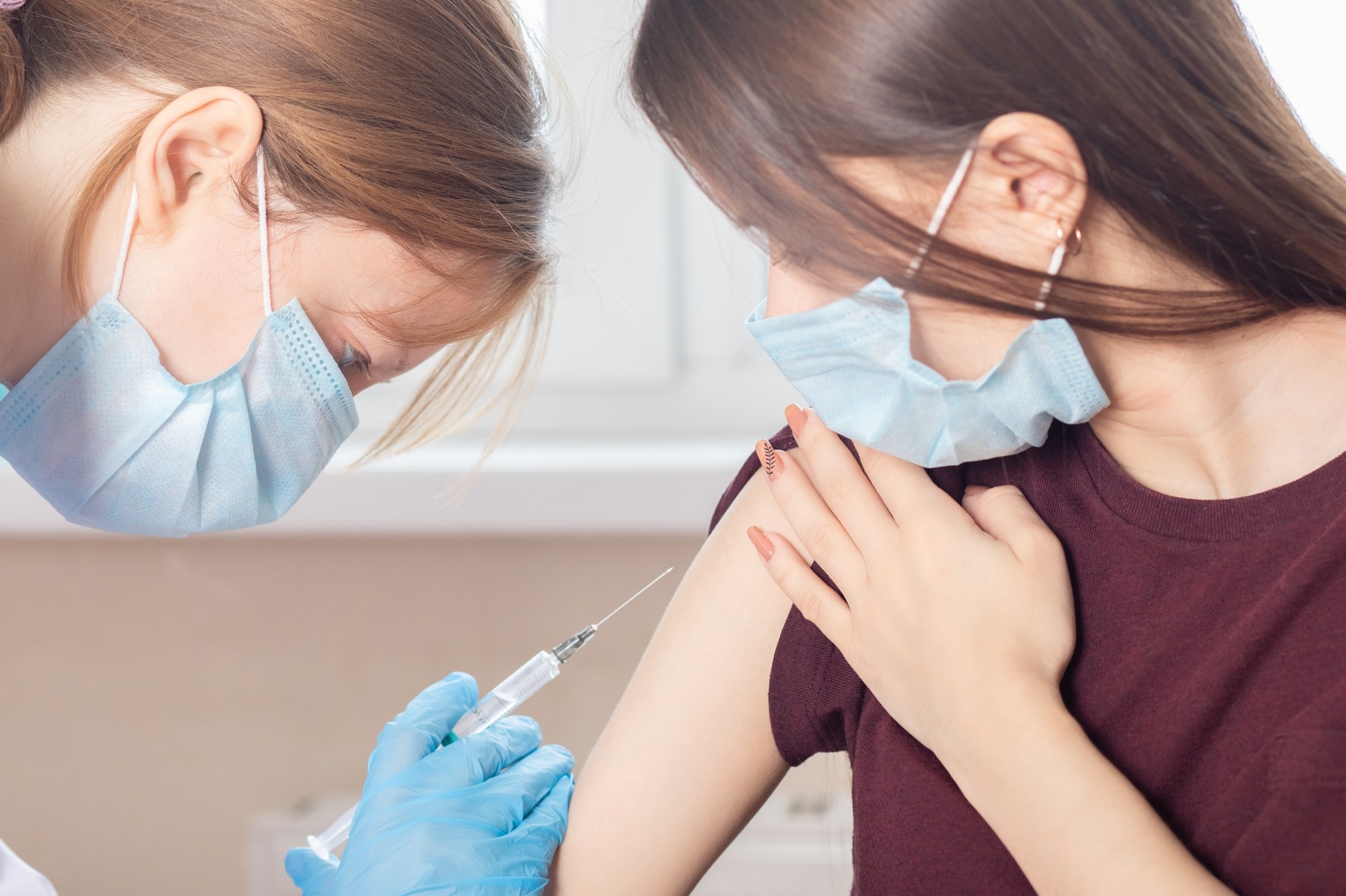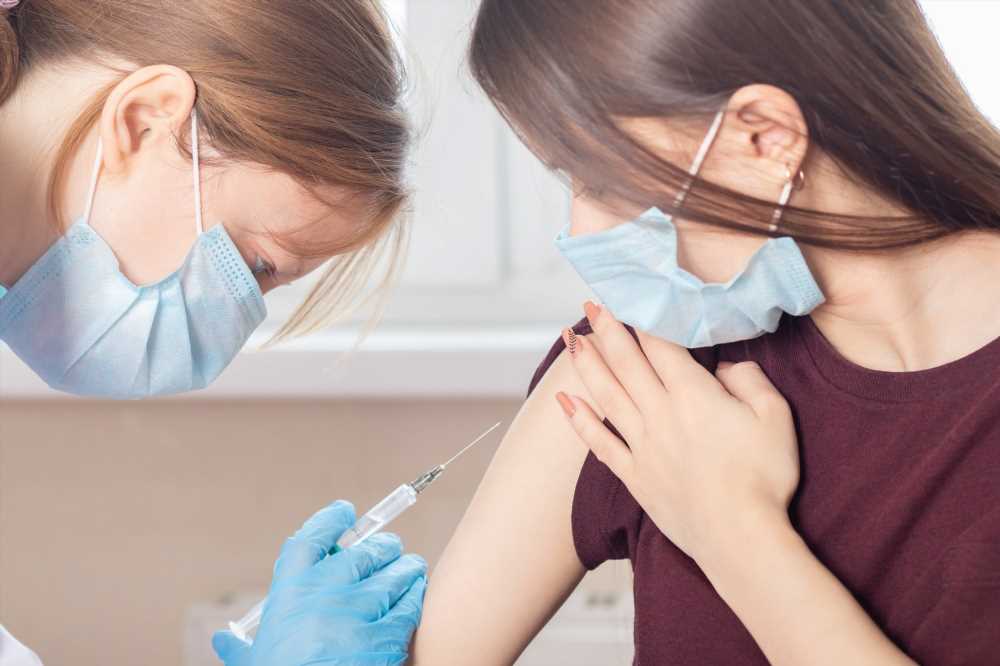In a recent study posted to the medRxiv* preprint server, researchers in the United States described the safety, efficacy, and immunogenicity of the NVX-CoV2373 vaccine against severe acute respiratory syndrome coronavirus 2 (SARS-CoV-2), tested in PREVENT-19 — a phase 3, randomized, placebo-controlled, observer-blinded trial among 12- to 17-year-old adolescents in the United States (U.S).
 Study: Safety, Immunogenicity and Efficacy of NVX-CoV2373 in Adolescents in PREVENT-19: A Randomized, Phase 3 Trial. Image Credit: Tikhonova Yana / Shutterstock
Study: Safety, Immunogenicity and Efficacy of NVX-CoV2373 in Adolescents in PREVENT-19: A Randomized, Phase 3 Trial. Image Credit: Tikhonova Yana / Shutterstock
Background
With the severity and associated mortality of the coronavirus disease 2019 (COVID-19) pandemic decreasing worldwide, global efforts are now focused on extending COVID-19 vaccinations to all age groups, especially adolescents and children. Although a majority of the severe COVID-19 cases and associated mortality were seen among the elderly and high-risk groups with comorbidities, children constituted over 20% of the cases and 0.4% of the mortality figures for COVID-19.
Messenger ribonucleic acid (mRNA) based vaccines consisting of SARS-CoV-2 spike protein have been authorized in the U.S. for use in younger children and adolescents. NVX-CoV2373 (Novovax) is a recombinant spike protein vaccine in a saponin-based adjuvant that has been approved in the U.S. and other countries for emergency use in adolescents between 12 and 17 and adults.
About the study
In the present study, the phase 3 trials for the NVX-CoV2373 vaccine were carried out, first in adults in the U.S. and Mexico, and then in adolescents in the U.S. between April and June 2021, when the SARS-CoV-2 Delta variant was predominant.
Participants enrolled in the pediatric expansion of the trial included adolescents between 12 and 17 years of age who were healthy or had stable chronic medical conditions such as cardiovascular disease, diabetes mellitus, pulmonary or renal diseases, or human immunodeficiency virus (HIV) infection that was well managed. Individuals with known immunosuppression or previous confirmed SARS-CoV-2 infections were excluded.
Data on solicited local and systemic, and unsolicited, serious, medically attended, and special interest adverse events were collected at appropriate time points during the study. A microneutralization assay was used to measure the immunogenicity at 50% inhibitory concentration using wildtype SARS-CoV-2 virus. Serum anti-SARS-CoV-2 spike protein immunoglobulin G (IgG) antibody levels and human angiotensin-converting enzyme 2 (hACE2) receptor binding inhibition (RBI) antibodies against SARS-CoV-2 spike protein were measured using enzyme-linked immunosorbent assays (ELISA).
Vaccine efficacy was determined based on reports by parents or guardians at the onset of mild, moderate, or severe COVID-19 symptoms. Reverse transcriptase polymerase chain reaction (RT-PCR) tests were used to confirm COVID-19. Whole-genome sequencing of the positive RT-PCR samples with sufficient viral load was carried out for lineage assignment. Geometric mean titers (GMT) and geometric mean fold rise (GMFR) were used to calculate immunogenicity.
Results
The results indicated that the NVX-CoV2373 vaccine was effective and safe across racially and ethnically diverse adolescents in the U.S. It showed high protective efficacy. The GMFR was comparable to that seen in young adults. A 79.5% efficacy was observed for the NVX-CoV2373 vaccine against the SARS-CoV-2 Delta variant.
The most common solicited local adverse event was injection site pain and tenderness. The most common systemic adverse events were headaches, fatigue, malaise, and myalgia. All adverse reactions, ranging from local to systemic, were comparatively more severe after the second vaccine dose. No safety events, deaths, or episodes of thrombosis with thrombocytopenia syndrome, anaphylaxis, myocarditis or pericarditis, or vaccine-enhanced COVID-19 occurred during the trial.
Neutralizing antibody GMT, serum IgG levels specific to wildtype SARS-CoV-2 and recently emerged variants, and hACE2 RBI antibodies were all higher in the vaccine group than in the placebo group.
The overall vaccine efficacy for NVX-CoV2373 was high in the adult and adolescent participants, providing evidence of broad protective immunity against current and emergent variants. Among the 2,247 participants, there were 20 COVID-19 cases, of which six were in the NVX-CoV2373 vaccination group, and 14 were placebo recipients.
Conclusions
The results of the PREVENT-19 clinical trials demonstrated that the NVX-CoV2373 vaccine was safe, efficacious, and successful in preventing severe COVID-19 in adolescents. In addition, humoral responses were observed in the participants against the wildtype SARS-CoV-2, the Alpha, Beta, Delta, Gamma, Mu, and Omicron variants, and the Omicron subvariants BA.1, BA.2, and BA.5.
The high efficacy and absence of severe adverse reactions have resulted in the approval of the NVX-CoV2373 vaccine for emergency use among adults and adolescents in the U.S. The authors believe that the broad protective effects displayed by the NVX-CoV2373 vaccine, combined with its favorable safety profile, would soon increase vaccination rates among adolescents.
*Important notice
medRxiv publishes preliminary scientific reports that are not peer-reviewed and, therefore, should not be regarded as conclusive, guide clinical practice/health-related behavior, or treated as established information.
- Safety, Immunogenicity and Efficacy of NVX-CoV2373 in Adolescents in PREVENT-19: A Randomized, Phase 3 Trial: Germán Áñez, Lisa M. Dunkle, Cynthia L. Gay, Karen L. Kotloff, Jeffrey M. Adelglass, Brandon Essink, James D. Campbell, Shane Cloney-Clark, Mingzhu Zhu, Joyce S. Plested, Pavitra Roychoudhury, Alexander L. Greninger, Nita Patel, Alice McGarry, Wayne Woo, Iksung Cho, Gregory M. Glenn, Filip Dubovsky. medRxiv. 2022. DOI: https://doi.org/10.1101/2022.09.20.2227990, https://www.medrxiv.org/content/10.1101/2022.09.20.22279903v1
Posted in: Drug Trial News | Medical Research News | Disease/Infection News | Pharmaceutical News
Tags: Adolescents, Anaphylaxis, Angiotensin, Angiotensin-Converting Enzyme 2, Antibodies, Antibody, Assay, Cardiovascular Disease, Children, Chronic, Coronavirus, Coronavirus Disease COVID-19, Diabetes, Diabetes Mellitus, Efficacy, ELISA, Enzyme, Fatigue, Genome, HIV, immunity, Immunodeficiency, Immunoglobulin, Immunosuppression, Mortality, Myocarditis, Omicron, Pain, Pandemic, Pericarditis, Placebo, Polymerase, Polymerase Chain Reaction, Protein, Receptor, Respiratory, Reverse Transcriptase, Ribonucleic Acid, SARS, SARS-CoV-2, Severe Acute Respiratory, Severe Acute Respiratory Syndrome, Spike Protein, Syndrome, Thrombocytopenia, Thrombosis, Vaccine, Virus
.jpg)
Written by
Dr. Chinta Sidharthan
Chinta Sidharthan is a writer based in Bangalore, India. Her academic background is in evolutionary biology and genetics, and she has extensive experience in scientific research, teaching, science writing, and herpetology. Chinta holds a Ph.D. in evolutionary biology from the Indian Institute of Science and is passionate about science education, writing, animals, wildlife, and conservation. For her doctoral research, she explored the origins and diversification of blindsnakes in India, as a part of which she did extensive fieldwork in the jungles of southern India. She has received the Canadian Governor General’s bronze medal and Bangalore University gold medal for academic excellence and published her research in high-impact journals.
Source: Read Full Article
